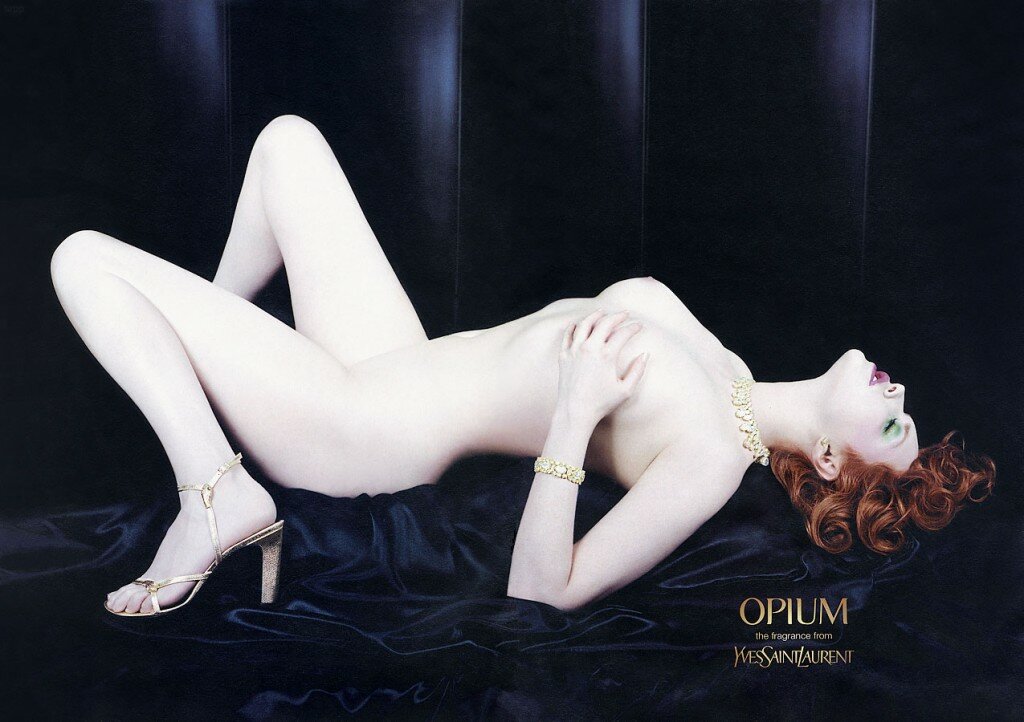
Sex sells. There are no two ways about it. It’s why Bond girls adorn the opening credits in, at most, skintight catsuits. It’s why Sophie Dahl caused such a stir posing for YSL (above). It’s (at least in part) why The Sun is Britain’s biggest selling paper. It’s why this blog – at it’s highpoint – got 32 comments per piece, and my other blogs are lucky to get 100 views in total. Per month! I have hugely benefitted from this simple human truth. In fact, when I was starting out as an erotic fiction writer a good friend suggested I take part in HNT to boost my readership – and it worked like a charm.
But my consciousness of this fact has changed. Where at eighteen I was keen to take advantage of eroticism as a selling point, feeling that taking control of my sexuality empowered me, and that I was somehow more evolved than my peers, it is now obscuring my intentions.
Within the fact that sex sells there is also another problem, which I would like to touch upon briefly. When it comes to Bond girls, and Sophie Dahl, and The Sun, and, well, me, there is a painful imbalance. It would seem that our only recognised sex symbol is female. Whilst I can appreciate the beauty of the YSL advert – as a photographer and as a designer – and may have found it intriguing as the naïve 10-year-old I was when it appeared on a billboard near my house, being a (mostly) straight female it is not actually a sex symbol that appeals to me. This is an extremely important point, and as I make the move into publishing my work, I will certainly be fighting for covers that don’t perpetuate this imbalance. But for now I will leave it to others to expose and discuss: Zoe Margolis expounded upon this with her talk Under Cover: Erotica and Sexism at The Lost Lectures (which you can watch in full – and I highly recommend that you do – by clicking the link).
But I digress.
It is widely accepted that mainstream publishers, and film production companies, etc. look down upon erotic art. Every day I read about erotic artists struggling against these attitudes, but rarely do I see a discussion that talks about why this is. Elsewhere in the world this may have much to do with religion and the stronghold it has on so many nations, but in the UK that is far less true. Whilst many people living in the UK are religious, it is not so pervasive that we won’t elect an atheist Prime Minister, or that we swarm to church every Sunday. It’s different here. Perhaps our prejudices are still based in a religious background, spanning thousands of years, but I believe a large part of the reason we reject sexuality from the mainstream now is that there is an idea that an aroused mind is a less cognitive mind. And to a certain extent, I agree.
When we seek to indulge our arousal, we are rarely looking for something that will stimulate us intellectually. In fact, I can speak to this from personal experience: I’ve been known to visit Literotica (which holds possibly the worst sex writing available) because it is easy to find the subject I want there, and when I’m aroused I don’t care as much about the quality of the writing. When we have sex and when we masturbate very few of us – I believe – are using this time to consider the financial crisis, or the state of the music industry. And why should we? Part of what makes sex so wonderful is the fact that it allows us to escape from the humdrum of our daily lives. The fact that this state of arousal is looked down upon by so many is utterly unfair. It is a large and important part of human experience, which ought to be explored with open minds.
But what happens when we do actually want to deal with sex critically? More often than not it is sold as titillation, taking us right back to where we started: setting up reader/viewer expectations to no more than material for sexual arousal, and if arousal makes it hard to think objectively, then that puts erotica amongst the most difficult arts to view critically. This then becomes a whole other issue, seeping into the huge problem we have with the vast amount of poorly written erotica and badly made pornography. People rarely complain about something that makes them come. (Additionally, even when sex is discussed by the media in cases of rape or abduction it is often done with a tone of sick fascination, playing to a similar type of arousal, which really displays the worst in human nature.)
It is an argument I have with myself at this time every year. With less than 30 days until National Novel Writing Month I am story plotting and character building and part of the NaNoWriMo form asks you to choose a genre for your novel. For the past three years I have used NaNoWriMo to write fiction that involves a lot of eroticism and for this reason I have felt compelled to put my novels into the Erotic Fiction category. However, the public perception that erotica is written to arouse makes this genre seem rather exclusive, and when I am writing novel-length fiction, eroticism is not the only thing I want to explore. Given that my plans for this year’s NaNoWriMo appear to be in a similar vein, the debate continues.
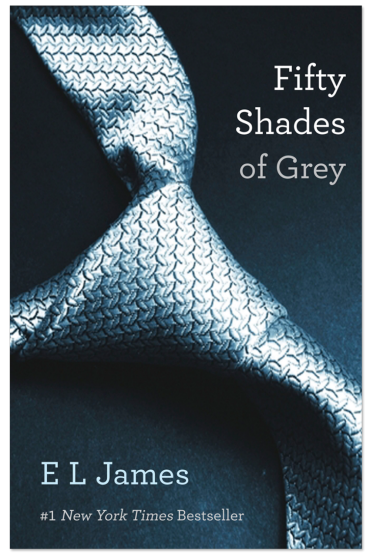 But my problem runs deeper: I do not write erotic fiction to arouse and it does not arouse me to write erotic fiction. For me, writing erotica is a way of exploring sexuality through my chosen media – literature. I long ago embraced the fact that my writing arouses people. I am not unhappy with the fact that people enjoy my work as something to get off to. However, nothing pleases me more than a response to my work that is reasoned and intellectual and opens up a discussion. It is through those conversations that I feel we learn the most about sexuality. In fact, I would go so far as to say that often I write pieces that push people’s boundaries in the hope that they will be too much for my readers’ arousal and force them to consider it critically rather than sexually.
But my problem runs deeper: I do not write erotic fiction to arouse and it does not arouse me to write erotic fiction. For me, writing erotica is a way of exploring sexuality through my chosen media – literature. I long ago embraced the fact that my writing arouses people. I am not unhappy with the fact that people enjoy my work as something to get off to. However, nothing pleases me more than a response to my work that is reasoned and intellectual and opens up a discussion. It is through those conversations that I feel we learn the most about sexuality. In fact, I would go so far as to say that often I write pieces that push people’s boundaries in the hope that they will be too much for my readers’ arousal and force them to consider it critically rather than sexually.
In the extreme, the fact that sex sells not only pervades my work as an erotic author, but also me as a human being. Via email, in comments, on twitter, I am bombarded with sexual innuendo and come-ons as though the fact that I write about sex makes me available and eager to take part in others’ sex lives. Of course, I am the only one who can control the way I present myself, and I am the only one who can take action against the way I am perceived – and I won’t deny that I do on occasion provoke those reactions. But even when I don’t do it directly I am still subject to these kinds of responses and so I think it bears mentioning.
There is nothing wrong in creating with the intention to arouse. In fact, with more and more marriages ending due to a lack of sexual fulfillment I feel we now, more than ever, need porn and erotica that opens people up sexually. On the other hand, this trend makes it very difficult to engage critically with the erotic arts and for me, at least, this is a real problem. The one thing that everyone seems to be able to agree on when it comes to Fifty Shades of Grey (and, actually Twilight as well) is that the cover (above, right) is brilliant. It is not at all explicit, but if you know anything about the book – and everyone now does – it is still appropriately erotic. Whilst we cannot dictate what will arouse people and what will not, covers and promotion and advertising do play a huge part in setting up consumer expectations, and so perhaps this is the first step in creating a sub-category of erotic fiction which deals with its subject critically, rather than using it to arouse. Because I cannot be the only one who feels this way.







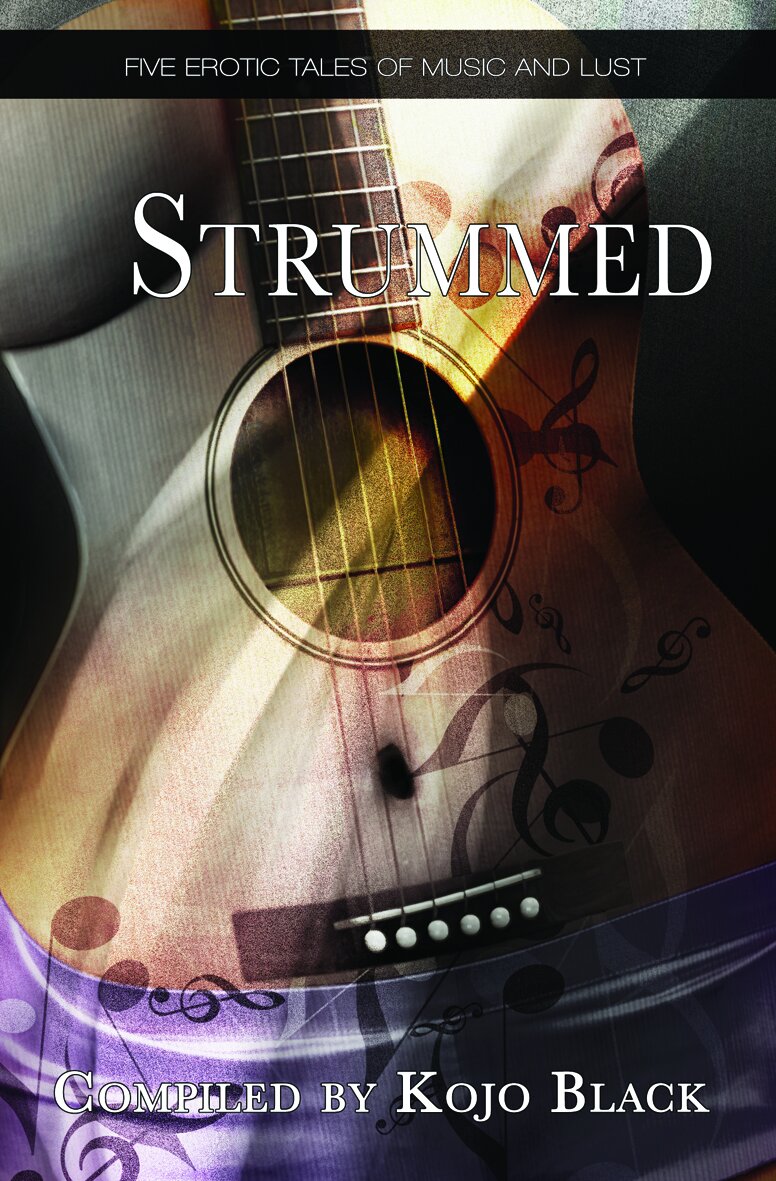
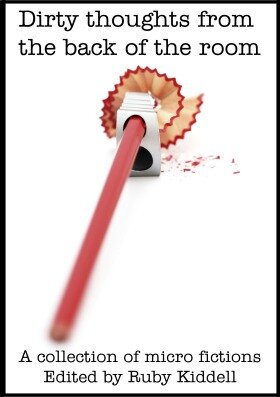

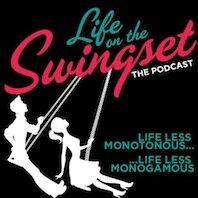
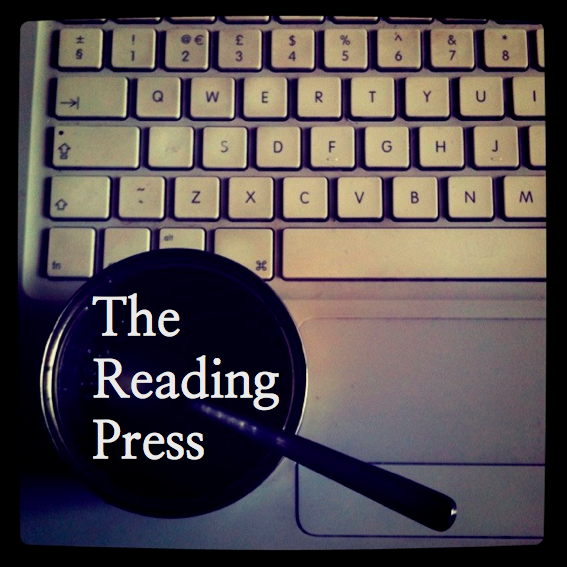

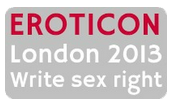


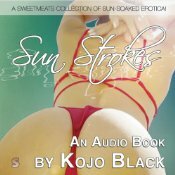


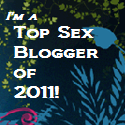

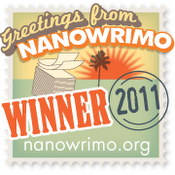


That’s interesting about covers. I wouldn’t have made that connection. Maybe you’re right. I hope so.
I find it interesting how many authors have reported that making the audience think actually *pisses some readers off.* The arousal expectation is so high and so ingrained, that some people react badly to anything that deviates from intentional deviation, even slightly.
Interesting. And a little unsettling. I have such respect for artists who treat their audience as though they are as smart as themselves.
Yes. All of this. Yes.
Merci.
Er, intentional titillation. Not, deviation. Though, yes. Intentional deviation, too.
Gosh. That’ll learn me to browse in the morning.
Haha, no worries – I understood.
I wonder if there is a line between ‘writing about sex’ (which doesn’t necessarily arouse, and may or may not write about sex in an interesting, intellectually stimulating way) and ‘erotica’, which, to me, by the very word itself, ought to attempt, at least in part, to arouse, even if that is not the whole or primary intent. I can get behind the idea of marking out works that deal with sexuality in a critical, exploratory way, and I think erotica writers are among the best writers to do so because they are far less coy about sex than many ‘mainstream literary’ writers seem to be (that last point might be just an impression). But I can’t quite break away from the idea that ‘erotica’ as a word has sexual pleasure (whatever form it takes, even if it seems deviant to some) and arousal at the core of it’s definition. This could be sheer pedantry for definitions my part, but I’d be curious to hear your thoughts on that.
You might be right actually: the word ‘erotica’ is very loaded with sex and arousal. However, I don’t think there is another word for the kind of writing I mean. But there is a difference between fiction that is erotic, and fiction that explores sex. The problem for me is that when you say ‘writing about sex’ I imagine non-fiction. Tricky but important difference I think.
Yes, the lack of an alternative word does make it tricky – and I agree that ‘writing about sex’ does sound more like non-fiction. (And the only options I can come up with right now are awful sounding word smooshes that makes ‘Brangelina’ look inspired!)
Then again, I could be being too narrow in my thinking; sci-fi and fantasy seem to cope with having an umbrella term within which many sub-genres that range from ‘a bit of fun’ to ‘serious and thoughtful’.
This is something that’s been going round in my mind a lot recently as well. I’m relatively new to this erotica blogging lark (for want of a better phrase), and up until now it’s really been a self-indulgent little place for me to write down some of my own fantasies. So yes, in the fictional pieces at least, I do find myself getting aroused when I am writing. However, recently, I have been toying with the idea of branching out a bit and writing about things that are perhaps a little further out of my comfort zone, purely to see a) whether I’m capable actually capable of doing it, and b) as a sort of mental exercise to see whether I can be a bit more distant and critical, which might actually help me improve.
You’ve definitely given me food for thought – thank you!
Thank you for your comment.
Yes, I think leaving comfort zones really hones our skills; the broader the spectrum of topics you’re writing, the better.
So arousal stacks the cards unfairly against talented erotic writers and filmmakers? Damn you, sex!
Haha, well, I suppose it depends what you write and what you intend to do by writing it.